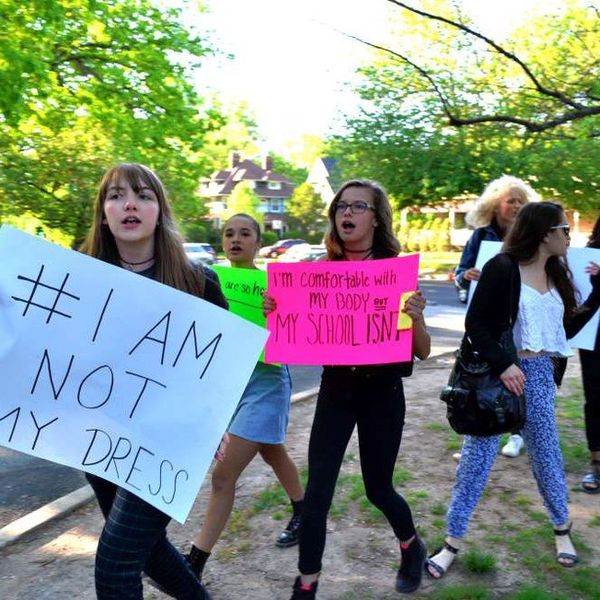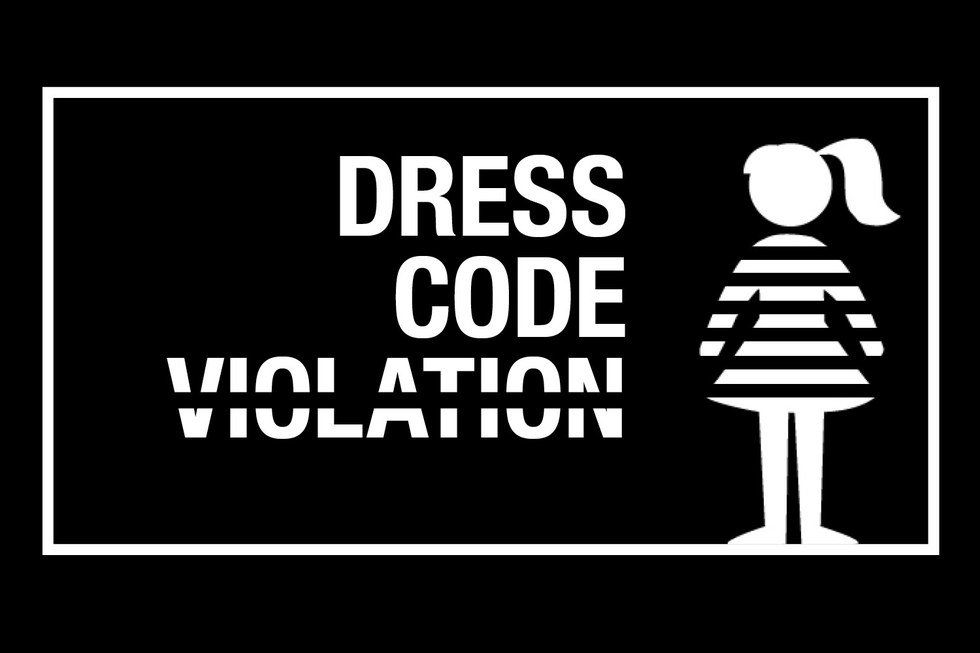It seems like all of my articles have a trend, and they always link back on why I believe in feminism; the reason is it mind boggles me why this kind of stupidity and irrationality still has some sort of existence in the world around us, and maybe, just maybe, someone will read my words and understand a little bit more about themselves and their world.
I absolutely positively hated, loathed, despised high school.
The reason being I never felt like myself, or like I could be myself — unless it was in a classroom where we discussed statistics, literature or math, high school was overall uncomfortable.
But the one thing I hated the most about high school was the school dress code. I am pretty sure that everyone else hated it too. Today I am going to narrow it down to three main points, because otherwise I will be here all day. And I am talking about all dress codes, not just my experience in particular, as it seems that radical dress codes permeate many schools in the United States
So here are the three problems I found with school dress codes.
1. The sexism behind school dress codes
We all know the basics — you can't wear this because it will be distracting to my classmates and even my teachers. Say what? Thinking back to my teenager self, that sentence alone is telling me — a child — that my body is sexual; it will be only seen as sexual, regardless of what I wear, and no boy or man can look at me and think of a million other things other than sex. That sentence tells me that I am not entitled to respect or basic human decency because fractions of my skin are showing. This is called female objectifying, as it is only placing my body as an object made for sex, in which others are placed as the consumers of our bodies. These rules are not only offensive to girls, but, beneath the surface, are also offensive to boys — saying boys will be boys and they can only think about sex and girls, but not about school or their friends. "It's OK, boys, we understand you and your inability to control your mind." Making excuses for boys at these very early stages of their development leads to the rape culture we live in today, which is what I find most disappointing.
2. School administrators place the school dress code above anything else.
My problem is not that there are guidelines to dress appropriately, since there will always be guidelines and uniforms that follow us all throughout our lives; there are dress codes for jobs, parties and get togethers. And some of the rules within dress codes do make sense, like don't wear an overwhelming number of gang-related colors, or don't wear shirts that have naked ladies on them or drug-related content. But how I see it, dress codes disproportionately target female students as well as blame them for their body development, making their bodies symbols of sexuality and, therefore, distracting. And what boils my blood the most is that these girls have to be pulled out of class, shunned and sometimes even sent home for showing their shoulders, arms, legs and even collarbones. When did it become a rule to place someone's education below a set of rules? It is truly disappointing. As someone who places her education above anything else in this world, it enrages me to know that there have been schools that have set up assemblies made just for girls in order to amplify their dress code, schools that have suspended girls out of school for wearing leggings and skirts, and schools that will make girls look for clothes and change into them in the middle of their school day in order to be less distracting. Oh don't worry, I don't have a test to study for or a lunch to eat or anything. Humiliation and shame is what will haunt teenage girls throughout their education, and I do not stand for that.
3. The outcome of school dress codes
The outcome is that girls begin to see their bodies as something that must be hidden away — or the opposite, that their bodies are only there for consumption and pleasure of others that can be linked to female self-objectification. Girls will no longer look and strive to be what they want to be but what they perceive others want them to be.
Another is one that girls see everywhere — girl on girl hate. On television, on the Internet, in books and even within their own home, girls are taught from a young age that they are not supposed to love each other and support each other but instead put each other down and envy each other. So now in school, they are taught that it is OK to slut shame one another and look down upon one another because their wardrobe is seen as sexual by their own school. I hear a plethora of comments from actual classmates saying, "That girl should be dress coded for her shorts," "That girl should get dress coded because of her big butt," "Not all dresses look good with certain body types."
And if these outcomes do not cross over the minds of administrators and schools, these problems will not go away.
Instead, I hope for a school system that teaches girls to feel empowered, regardless of what they look like to others, and feel comfortable within their own bodies, leading them to dress for themselves.





















